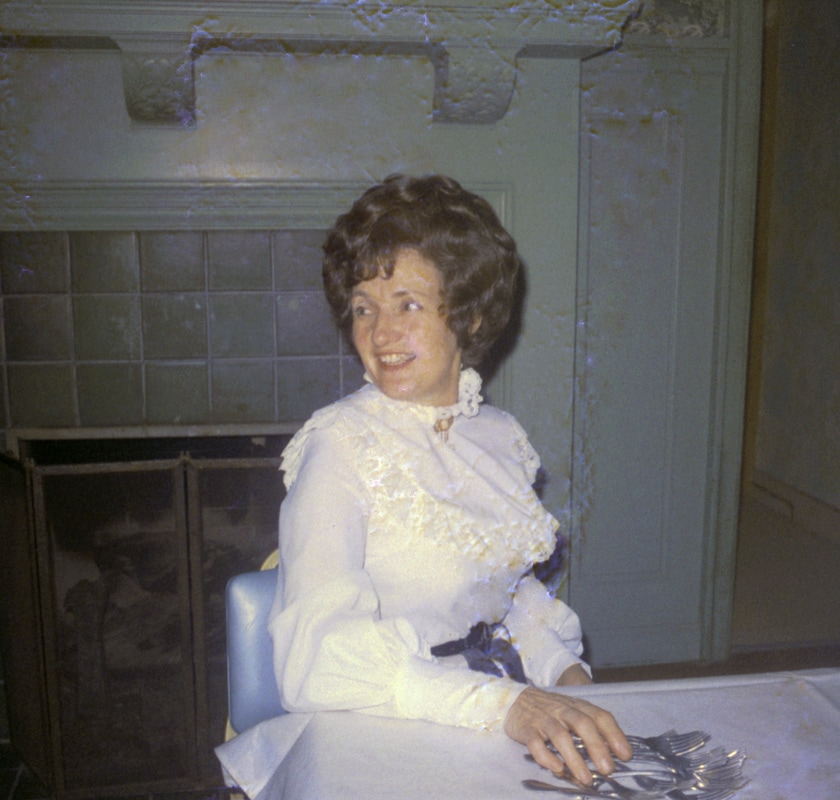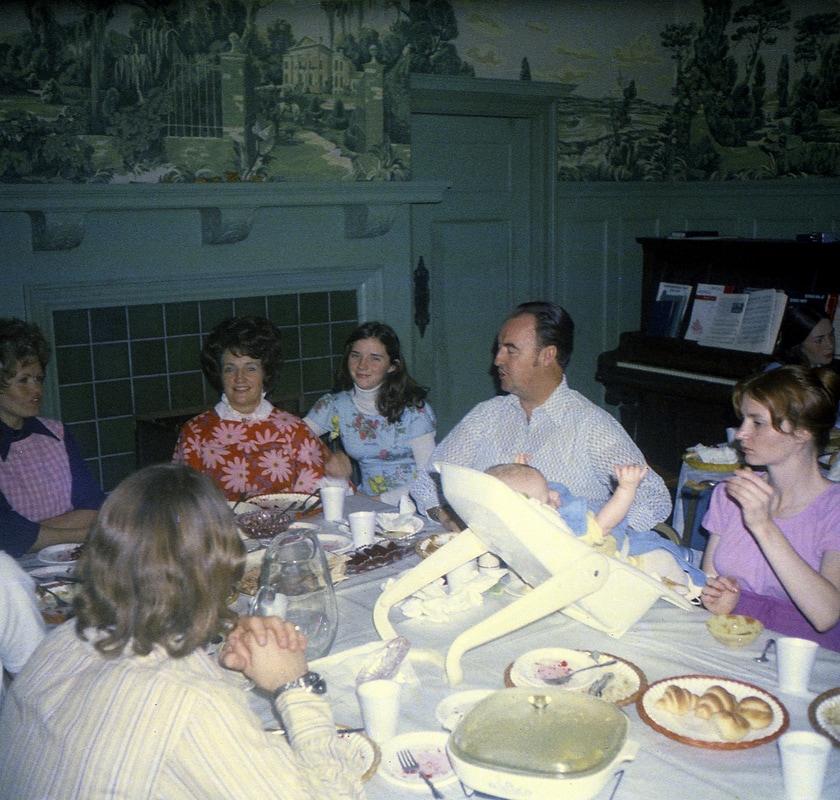|
Some probably found it surprising that a family with so many rambunctious children could be tamed (at least occasionally), but Mom and Dad insisted we learn our manners. Our training began at the front door. Dad, a psychologist who ran his counseling and testing business in the east wing of Tanner Manor, had his clients come and go through that door. They might have preferred to slip in and out quietly, but we Tanners would have none of that, least of all Dad. He took full advantage of our ever-revolving door to help his children develop some professional polish. Never ashamed of our hand-me-downs or homemade haircuts, Dad would pull us to his side and proudly introduce us as his “favorite seven-year-old” or his “favorite fifteen-year-old,” and so forth. We could usually count on him getting our names right, but “Don’t ask me to remember their birthdays,” he’d say each time, only half-jokingly. With each introduction, we were required to “Look ‘em in the eye!” while giving a firm handshake. With that kind of practice, we learned over time to be “free and comfortable in all situations,” just as Dad would train his clients to be. Dad made sure my brothers learned how to treat women. Bettyanne Johnson, our neighbor, remembers seeing him stand up every time my mother entered the room. He also modeled chivalry by opening doors for women and helping them in and out of cars. Mom was so accustomed to being treated that way that, even when my dad wasn’t around, she would unthinkingly remain in the car until one of my brothers remembered to help her out. A family as large as ours might have been excused for diving headlong into food, much like the famous scene from Seven Brides for Seven Brothers when the new sister-in-law Millie fixes a beautiful meal only to have it devoured in seconds by her brutish brothers-in-law. Although some of my siblings say they were always hungry, and others blame their small stature on not getting their fair share of the food, I personally don’t recall having to fight so hard for my piece of the pie, so to speak, even if it was only a small piece. Even Tanners had their manners. In fact, mealtime was when we received most of our etiquette training. Before meals, Dad would always help seat Mom at the table. (Evidently, this habit was not just for show because Mom told me years later, after all of us had left home and the two of them ate alone, Dad continued pushing in her chair at every meal.) He further honored Mom’s place by reminding us she was the hostess. This meant we were not to begin eating until after she took her first bite. In fact, by the time I came along, we not only had to wait for Mom to eat but we were also required to wait for everyone else to be served and for someone to say a blessing. This mealtime protocol was deeply ingrained in all of us, including Bryan, the youngest. Once, Nan Grass, a friend and professor to several of my older siblings, invited us to her home for a backyard meal. Instead of starting to eat after the blessing, we were distracted by her dog playing in the grass. Suddenly, we heard Bryan shout, “She’s eating!” Thinking he was referring to the dog, we all laughed when we realized he had been hungry but was politely and patiently waiting patiently for Nan to take a bite so he could finally begin eating his food. Once a week on Sundays, we sat at the long table in our formal dining room, also known as “The Green Room.” There, Mom and Dad would try to coach us on the finer points of eating politely. I usually sat to Dad’s left where he could scrutinize my eating habits. Often, he chide me gently, “Don’t talk with your mouth open” and “Don’t lick your knife!” I suppose these mini-corrections were necessary, but our behavior as a group was not really formal at all.
Touching, for example, was a big part of being a Tanner. So, we thought nothing of getting up in the middle of a meal, walking over to a sibling, and giving a friendly punch in the arm or chest. Laughing was also important in our family. So, if we felt like imitating something funny we’d seen at church, we’d simply stand up and perform on the spot before our captive audience. Learning was another value underscored at Tanner meals. In fact, we were always free to share what we had learned in church, ask questions, or talk about the latest book we were reading. Even the youngest of us were encouraged to chime in with our own opinions on issues. It’s just that no one else might be listening. This is because, collectively, our family failed miserably in one area of proper conduct: we interrupted. To a Tanner, to interrupt another with a question or interjection was not to be rude but, instead, to show intense interest in a person. Our Tanner zest and enthusiasm, shall we say, made for very noisy meals in which almost everyone talked at once. I always found these times very fun, highly stimulating, and always energizing. Years later, I got a different perspective from my husband, an introvert, who told me that in his world interrupting was the height of rudeness. Old habits die hard. For all the trouble our parents took to ensure our proper table etiquette, Dad’s “Fifty-Fifty” tradition stood in ironic contrast. At any given point in a meal, most often when we were partway through eating dessert, Dad might reach over to our plate, swipe half of what we had saved for last, and simply pronounce, “Fifty-Fifty!” Consequently, we all began modeling his behavior. Being on both ends of giving and taking food without permission felt normal to us, but being forced to share unawares did not go over well with future roommates or spouses. In Tanner Manor, proper language was also deemed essential to proper conduct. Although I did hear an occasional “Damn!” slip from Dad, swearing was generally not allowed. Mom, chief gatekeeper of the grammar, leveled a certain class snobbery against those who didn’t know when to use “who” vs. “whom” and who couldn’t apply other usage rules correctly. As many mothers do, Mom believed in elevating our station by making sure we could read, write, and speak the Queen’s English. In spite of all our parents’ efforts to refine us, we were not little angels. Daken, Scott, and Bryan could burp with the best of them—in fact, Bryan was famous for speaking full sentences using one, long burp—and the same brothers often entertained themselves with gas-passing contests. We opened doors and greeted people warmly, but we were just as all apt to mindlessly slam those same doors. We learned to wait for a blessing to be pronounced on the food, but we’d just as often sneak peeks at each other and giggle through the entire prayer. In short, we were taught how to behave properly, but we had just as much fun breaking the rules as we did learning them.
2 Comments
Claralyn
3/23/2017 12:44:23 am
Janet you have such a gift with words and you tell the truth. Love it. Reading this and listening to the 4 podcasts I learned a great many stories I had no idea about. Thank you so much for doing this !!!
Reply
Stacia Watkins
3/24/2020 01:46:41 pm
Super fun to run across your blog and hear of your upbringing! What a delight you and your family members are! What a privilege to know you, sister!
Reply
Leave a Reply. |
Meet JanetI'm the twelfth of 13 children. I was born into a poor family rich in blessings. We lived in South Pasadena, California on top of a hill in a big house we called Tanner Manor. These are my stories of growing up there. Archives
June 2024
Categories |


 RSS Feed
RSS Feed